Opposition Figure Says World Enabling Iran's Hostage-Taking
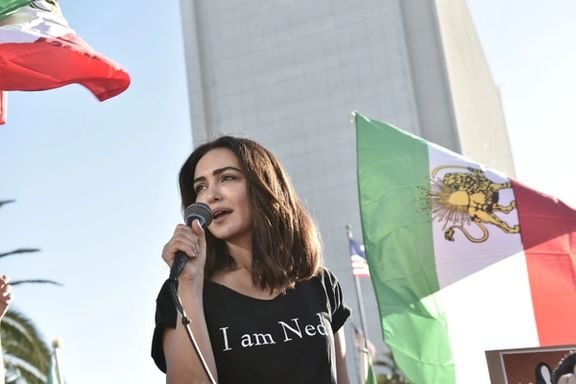
Iranian-born actress and political activist Nazanin Boniadi has criticized the international community for showing leniency towards the Islamic Republic on numerous occasions.

Iranian-born actress and political activist Nazanin Boniadi has criticized the international community for showing leniency towards the Islamic Republic on numerous occasions.
Boniadi is a prominent voice amongst the opposition and has been critical of the United States (US) and European countries for allowing Iranian authorities to use international platforms for spreading propaganda and furthering their malign activities in the region.
Iran’s foreign Hossein Amir-Abdollahian spoke at the United Nations General Assembly meeting on Thursday about brokering a deal regarding the release of the hostages who are being held by Hamas.
Iran’s foreign minister said Hamas is ready to release hostages to the Islamic Republic, and he said the international community must take responsibility for releasing 6,000 Palestinian prisoners held in Israel.
In a post on X, Boniadi went on to criticize the fact that Iran’s foreign minister has been given a platform to talk about hostages when Iran is a well-known practitioner of the hostage-taking crime.
“The international community has incentivized hostage diplomacy and the Islamic Republic and its proxies will continue to use this heinous crime to achieve their political goals as long as the world lets them,” said Boniadi.
In September, the US and Iran made a deal through which five Iranian- American hostages kept in Iran were released in exchange of $6 billion of frozen assets now held in Qatar. The agreement received wide condemnation from US lawmakers and Iranian opposition figures including the former Crown Prince of Iran, Reza Pahlavi.
“Unfortunately, the billions of dollars that the Biden administration will reportedly release to the regime as ransom for five hostages will not reduce the suffering of my countrymen,” said Pahlavi on X.
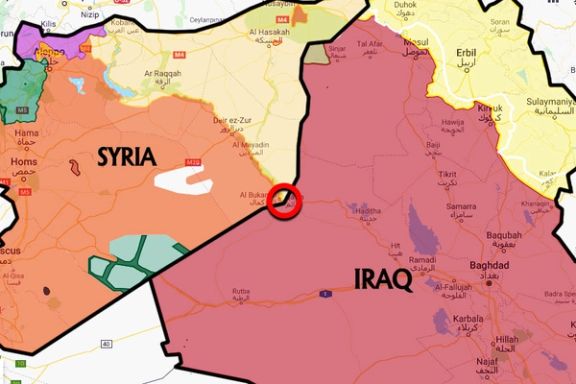
Two US fighter jets struck weapons and ammunition facilities in Syria on Friday in retaliation for attacks on US forces by Iranian-backed militia in the past week.
US President Joe Biden ordered strikes on the two facilities used by Iran's Revolutionary Guard Corps and its militia groups, the Pentagon said, warning the US will take additional measures if attacks by Iran's proxies continue.
US and coalition troops have been attacked at least 19 times in Iraq and in Syria by Iran-backed forces in the past week. Hamas, Islamic Jihad and Lebanon's Hezbollah are all backed by Tehran.
Iranian Foreign Minister Hossein Amir-Abdollahian said at the United Nations on Thursday that if Israel's offensive against Hamas did not stop, the United States will "not be spared from this fire".
Several former US officials, Republican senators and others were criticizing the Biden administration for not responding to the attacks, and for permitting Iran’s foreign minister to come to New York, while his government’s role in the October 7 attack by Hamas was clear.
The US air strikes took place at roughly 4:30 a.m. on Friday (0130 GMT) near Abu Kamal, a Syrian town on the border with Iraq, and were carried out by two F-16 fighter jets using precision munitions, a US defense official said.
"These precision self-defense strikes are a response to a series of ongoing and mostly unsuccessful attacks against U.S. personnel in Iraq and Syria by Iranian-backed militia groups that began on October 17," US Defense Secretary Lloyd Austin said in a statement.
"These Iranian-backed attacks against US forces are unacceptable and must stop," Austin said, directly pointing fingers at the Iranian regime. However, the US response came after days of Iranian-backed attacks that injured scores of US troops. The delay, some argued, was emboldening Tehran.
Biden has sent a rare message to Iranian Supreme Leader Ayatollah Ali Khamenei warning Tehran against targeting U.S. personnel in the Middle East, the White House said earlier on Thursday.
"What we want is for Iran to take very specific actions, to direct its militias and proxies to stand down," a senior US defense official said. The United States did not coordinate the air strikes with Israel, the official added.
The United States has sent warships and fighter aircraft to the region over the last three weeks. On Thursday the Pentagon said about 900 more US troops have arrived in the Middle East or are heading there to bolster air defenses for U.S. personnel.
While the situation in the Middle East remains fluid, the U.S. has taken steps to deter further escalations, deploying two aircraft carriers, additional fighter squadrons, and air defense systems in the region.
In his statement Secretary Austin warned: “if attacks by Iran’s proxies against U.S. forces continue, we will not hesitate to take further necessary measures to protect our people.”
It’s not clear if any Iranians were present at the sites.
Austin has emphasized that the strikes in eastern Syria are "separate and distinct from the ongoing conflict between Israel and Hamas” and do not constitute a shift in the Biden administration’s approach. It is hard, however, if not impossible, to not see the bombing of facilities in Syria against that backdrop.
Israel said on Friday military raids into Gaza were preparing "the next stage of the operation", amid fears that a ground invasion of the Palestinian enclave could spark a wider Middle East conflict.
According to Gaza health authorities, at least 7,000 have been killed in Israeli airstrikes in the 20 days Since the Hamas attack on Israel (which killed 1400), while this figure cannot be independently verified. The regime in Iran has boasted many times about that operation and its support for Hamas.
The Islamic Republic supports several militant groups in the region, most notably Hezbollah in Lebanon. The Biden administration is weary of an all-out war involving these groups, which could be costly, economically and politically. But the continued attack on American forces seems to have taken the President over the decision edge.
Some observers have pointed out on social media that the Biden administration has had far fewer attacks on Iran-affiliated targets than the other way round.
With reporting by Reuters

The reformist Shargh daily in Iran reported that 84 percent of the over 12,000 respondents to its poll on hijab are opposed to mandatory dress code and headscarves.
The online poll, completed over a period of one month, was conducted after lawmakers, mostly affiliated to the ultra-hardliner Paydari Party, ratified a bill in September that they have named "Protection of Family Through Promotion of Hijab and Chastity Culture".
The legislation, originally prepared by the government and later modified by the parliament’s hardliners, proposed various penalties including heavy cash fines for women who do not abide by the prescribed dress code of the Islamic Republic. This dress code consists of a headscarf covering all hair and the shoulders, a loose long tunic with long sleeves, and trousers that cover the legs to below the ankles.
The constitutionally mandated 12-member Guardian Council which, among other things, has the final say in legislation, rejected the bill on Tuesday in a surprising move and asked the parliament to amend it.
The Council has found several formal shortcomings in the text including vagueness of some of the terms used in it, such as a term translatable as “unchastity” or “corruptness”.
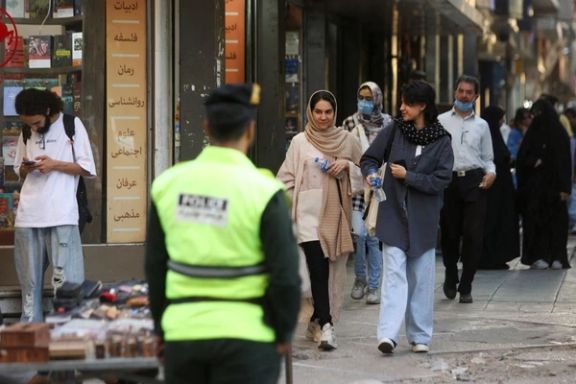
The Council’s rejection of the proposed hijab law has nothing to do with people’s objection to it, Asieh Amini, a Norway-based women’s rights activist, told Iran International. According to Amini, the reason for the Council’s rejection is based on the hardliners’ wish to make the legislation as watertight as possible.
Others believe the Guardian Council may have been apprehensive about increasing the people’s discontent with the regime before the upcoming parliamentary elections in March. The elections four years ago had the lowest participation rate in the four-decade history of the Islamic Republic.
“The outcome of this bill will be nothing other than increasing people’s discontent, decline [of belief] in hijab, and deepening of the rift between the government and the people,” conservative journalist Behrouz Mirzaei-Shirmard tweeted before the Council’s rejection of the bill. He said he hoped “those in the system who are wise and care” would stop the bill, which “is in contradiction with citizen’s rights” from being approved.
In the past few months, hardliners have tried to impose strict hijab rules in government offices, schools and universities, hospitals and other public places. Nevertheless, many women are defying the hijab rules.
For instance, Habib Ilbeigi, the director of the supervision department of the Islamic Guidance Ministry’s Cinema Organization, said that actresses who have defied hijab standards will be banned from acting.
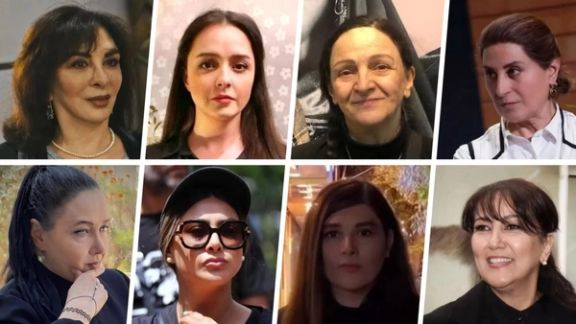
The department has released a list of banned actresses that includes many popular actresses including Baran Kowsari, Vishka Asayesh, Taraneh Alidoosti, Katayoun Riahi, Pantea Bahram, Hengameh Ghaziani and Pegah Ahangarani.
The organization is mandated with the approval of public screening and streaming of all films produced in Iran, and very often implements censorship by rejecting scripts or modifying them.
Sources in Iran say in many places, wearing the hijab now is stranger than not wearing it, as the number of women wearing ordinary clothes and no headscarf has hugely increased.
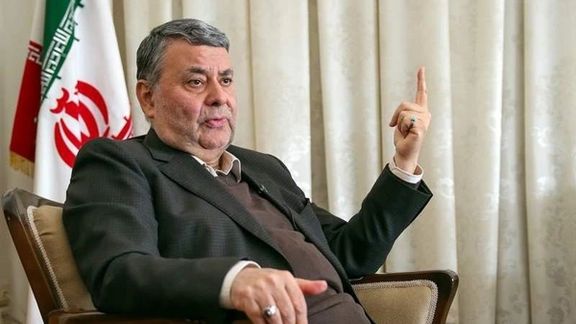
A member of Iran’s Expediency Council says the Islamic Republic does not intend to participate in the Gaza war in spite of funding its proxy Hamas.
Mohammad Sadr told the pro-reform Ham-Mihan daily on Thursday that Tehran will only continue to “exert pressure on Israel's supporters to stop the attacks on Gaza," though the Islamic Republic provides training, weaponry and intelligence to its largest Palestinian proxy.
Hamas declared war on Israel on October 7 after its militia invaded Israel by air, land and sea, killing at least 1,400 and taking at least 220 captive.The majority killed were civilians, including women, children and whole families.
The group, designated by the UK, US and EU, began the operation named the 'Al-Aqsa Flood' with a barrage of at least 3,000 rockets as preparation for what would become the single most deadly day for Jews since the Holocaust.
Israel has been hitting Gaza with a continuous flow of airstrikes and is preparing for a ground offensive as it vows to destroy the Iran-backed proxy.
Sadr warned that if a ground incursion takes place, the risk of escalation is higher, demanding a ceasefire, which Israel claims will only be manipulated by Hamas.
"Current initiatives by certain nations and international bodies aim to broker a Gaza ceasefire and compel Israel to halt its actions. Should a ceasefire be achieved without Israeli ground intervention in Gaza, the prospect of the conflict extending to other nations is highly unlikely," he said.
"However, in the event a ceasefire is not reached, and the Israeli military launches a ground incursion into Gaza, persisting in the extensive casualties among Palestinian civilians, the risk of an escalation of the conflict with involvement of other parties becomes more probable."
Iranian proxy Hezbollah in Lebanon continues to target Israel from its northern border while missiles have been fired towards Israel from its proxies in Yemen and Syria already.
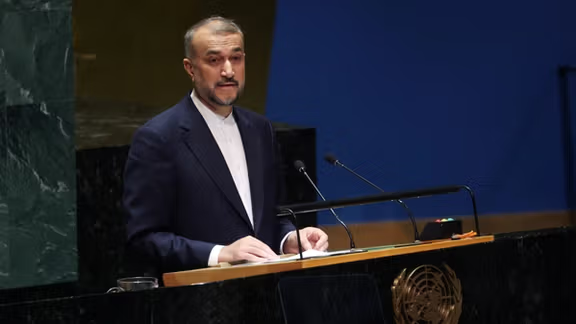
Iran’s foreign minister told the United Nations on Thursday that US forces in the Middle East will not be spared if the Israeli offensive against Hamas continues.
Hossein Amir-Abdollahian reiterated the regime’s warning during an emergency meeting of the UN General Assembly on the Israel-Hamas conflict in New York. "I say frankly to the American statesmen, who are now managing the genocide in Palestine, that we do not welcome the expansion of the war in the region. But if the genocide in Gaza continues, they will not be spared from this fire.”
“It is our home and West Asia is our region, we do not compromise with any party and any side, and we have no reservation when it comes to our homes’ security," he added.
Amir-Abdollahian, who usually speaks in Persian in his diplomatic interactions, delivered the threat in English while in New York, a trip that has invoked strong protests by US lawmakers and activists who have repeatedly urged Washington to deny visas to Iranian officials.
After several minutes of speaking in English, which he spent justifying the brutal Hamas incursion into Israel as a natural reaction to occupation, he switched back to Persian. One of the keywords that Amir-Abdollahian tried to convey in English was "genocide” in reference to Israel’s retaliatory attacks on Gaza after Hamas slaughtered more than 1,400 Israelis and took over 220 as hostages. Palestinian authorities say Israeli air raids have killed more than 7,000 Palestinians, a figure that many such as US President Joe Biden have cast aspersions on.
The regime’s top diplomat said Hamas has told Iran that it was ready to release civilian hostages, adding, "The Islamic Republic of Iran stands ready to play its part in this very important humanitarian endeavor, along with Qatar and Turkey. Naturally, the release of the 6,000 Palestinian prisoners is another necessity and responsibility of the global community." Iranians say on social media that Tehran is a master of prisoner swap deals, and has proved this expertise after it made Washington release billions of dollars of frozen funds as well as five Iranians from US prisons in exchange for five Iranian-Americans held hostage in Iran.
Another salient psychological and linguistic effort by Amir-Abdollahian was aimed at portraying Hamas as a group of “freedom-fighters” or a “liberation army” and not a terrorist group as designated by the US and several other countries.
The regime’s foreign minister referred to Security Council Resolutions No. 309 and 323 ratified 1972 in the case of Namibia, stating that the "inalienable right to self-determination and independence" is permanent and does not disappear over time. “Therefore, just as the prolonged occupation of the land does not create any rights for the occupier, the passage of time does not diminish the right to determine the fate of the occupied nation.” He used this argument as a tactic to conclude that “the Palestinian nation, as a nation under occupation, has the legitimate right to resist the occupation using all available methods, including armed struggle." Therefore, the October 7 attack – codenamed operation al-Aqsa flood by Hamas – should not be described as a terrorist act, he said.
Amir-Abdollahian complained that the US and several European countries have sided with Israel and refer to the Palestinian liberation movement as "terrorists”. He claimed that the US' “unwavering and permanent” support for Israel as “the main cause of the failures of the United Nations, especially the Security Council, in upholding the rights of the Palestinians.”
He did not openly repeat the Iranian regime's call for the destruction of Israel, but said the only solution to the conflict is “through the full realization of the inalienable right of this nation to self-determination and the establishment of an independent Palestinian state in all of the Palestinian territories and with Al-Quds as its capital.”
Emphasizing that “the entire land of Palestine, from the sea to the river, belongs only to the original Palestinians, including Christians, Jews and the Muslims,” Amir-Abdollahian said Iran has “offered a political and democratic initiative which includes the holding of a referendum for self-determination amongst the original residents of Palestine.”

Amir-Abdollahian started his speech with a statement that is globally contested, if not debunked altogether. “The world knows that the Islamic Republic of Iran plays the most constructive role in helping peace and security in West Asia and the whole world as well as fighting terrorism and ISIS,” he claimed despite many labeling Iran as “the biggest state sponsor of terrorism” with a “hostage diplomacy” modus operandi.
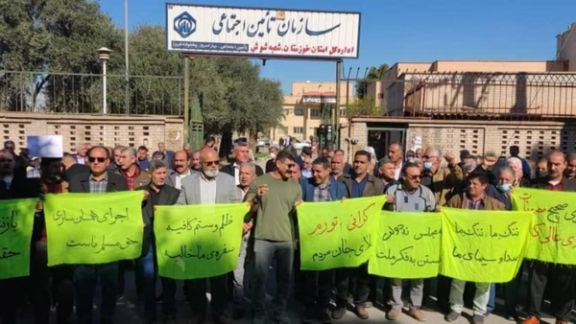
A worsening crisis of insolvency in Iran's social security system and pension funds, poses an additional threat to the unpopular establishment in Iran.
The reports and videos sent to Iran International demonstrate that retirees in different provinces such as the oil-rich Khuzestan, Kermanshah and Kordestan have launched rallies over the recent days to voice their discontent about the government’s economic policies. The protests are expected to continue as pension funds in Iran are experiencing a full-fledged financial crisis.
Shargh newspaper in Tehran provided coverage from a gathering of economic experts who discussed the issue, highlighting the challenges faced by Iran's pension funds, with many receiving no funding at present. The government's debts to Iran's Social Security Organization are steadily increasing, leading to concerns that the government might need to transfer the entire oil industry to the Social Security Organization to settle its debts.
Iran’s pension funds find themselves in an unfavorable situation with many of them receiving zero input at the present, Shargh quoted a former director of Iran’s Social Security Organization Mehdi Karabasian as saying.
Hossein Abdoh, economist and former Secretary General of Tehran Stock Exchange, also pointed out that the Iranian government does not fully comprehend the imminent crisis of the pension funds.

He noted that the government’s debts to Iran’s Social Security Organization are increasing steadily.
“It seems that one day the government will have to give the whole oil industry to the Social Security Organization to settle its debts,” Abdoh warned.
Iran has faced a serious economic crisis since the United States withdrew from the JCPOA nuclear accord in 208 and imposed oil and banking sanctions. Its failure to reach a new agreement under the Biden administration has gradually drained government finances and rounds of serious anti-regime protests have taken place.
Iran’s Social Security Organization is a public institution that provides health insurance, pension and unemployment benefits to its members. They range from workers and government employees to self-employed individuals. According to official statistics, 53 percent of the Iranian population receive some type of benefit from the organization.
On October 24, Moslem Salehi, a member of the Economic Commission of Iran's parliament, said in an interview with Tasnim news agency that all pension funds, “except two or three,” have gone bankrupt.
Without the government’s assistance, these funds will not be able to meet the needs of the retirees, he stipulated. However, the issue is not limited emergency funding, but the underlying factor of a weak economy, mismanagement, corruption, and a huge government budget deficit.
According to Shargh, in the current budget, $6.62 billion of public expenditures has been allocated to pension funds. This is while the government still owes $3.4 billion to the pension funds.
Experts have warned against the policy of funding pension funds via annual budgets, saying that this will result in unfortunate consequences in the future.
In May 2023, the then-director general of social insurance in Iran’s Ministry of Labor, Sajjad Badamforoush said that even if the government sells the two southern islands of Kish and Qeshm and Khuzestan province, it will not be able to pay pensioners' arrears.
He was fired a few days after these remarks.
Earlier in the year, a report in Rouydad24 also pointed out that the crisis concerning the pension funds will paralyze Iran and will plunge its economy into a new crisis in less than two decades.
Touching upon the critical condition of the pension funds, Hossein Amerian, general director of steel industry pension fund, revealed in April 2023 that around $400 million was lost either through mismanagement or embezzlement.
There are 800 investigations taking place to identify all those who are responsible for the losses, he added.
In May 2023, Rahim Mombeini, the deputy head of Iran’s Planning and Budget Organization, announced that President Ebrahim Raisi’s administration faces a huge budget deficit this year.
According to Mombeini, the amount of the Iranian government internal debts has increased about 900-fold over the past decade to $60 billion. This amount of debt, which is equivalent to 31% of the GDP, includes government debts to banks, the Central Bank of Iran, pension and social security funds, public and private sector contractors, and bonds that have been issued in previous years.